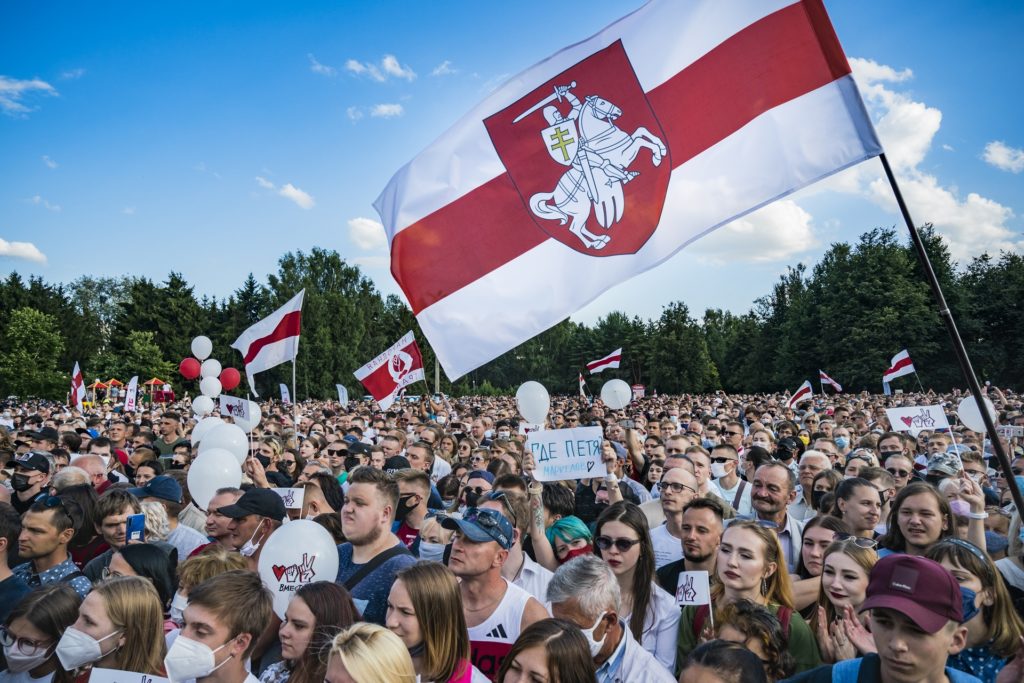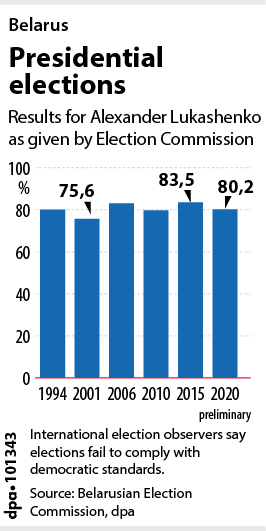Belarusian challenger safe in Lithuania amid violent police crackdown

Belarus’ top opposition candidate against long-time President Alexander Lukashenko is safe in neighbouring Lithuania, the Baltic state said on Tuesday, following two nights of a violent police crackdown on protests throughout Belarus.
Election results announced
The candidate, Svetlana Tikhanovskaya, was forced to leave Belarus and is currently with her children in a protected place, Lithuanian Foreign Minister Linas Linkevicius said in televised comments to the BBC.
There was a period of seven hours when Lithuania, which had been in contact with Tikhanovskaya, could not reach her as she was being detained by the Belarusian authorities, Linkevicius said.
“She was experiencing pressure … and was forced to leave the country,” the Lithuanian top diplomat said. He had earlier said in a statement on Twitter Tikhanovskaya was safe and in Lithuania.
Prominent independent Belarusian news outlet Tut.by reported that Tikhanovskaya had been forced by Belarusian authorities to leave the country overnight in a deal to free her jailed campaign manager, Maria Moroz.
Tikhanovskaya released a video posted by Tut.by on Tuesday in which she appeared visibly distressed.
Without elaborating, she said she had made a decision for which many people will judge her. “God forbid you would ever have to face the choice I did,” she said. “Not one life is worth what is currently happening.”
In another video, circulated on Twitter, Tikhanovskaya expresses acceptance of the official election results and calls for her supporters to refrain from participating in street protests.
Twitter users said that Belarusian authorities had compelled Tikhanovskaya to make that statement.
Early official results showed Lukashenko heading for about 80 per cent of the vote. Tikhanovskaya had previously rejected that outcome as a fabrication.
READ ALSO – Jobless and desperate: the post-lockdown reality for many
Protests across Belarus
Protests erupted in Minsk and several other cities following the scheduled end of voting on Sunday, as long lines of potential voters were unable to cast ballots.
Police were filmed beating protesters with truncheons and reportedly fired rubber bullets in an effort to disperse the crowds. Protesters were also filmed beating police officers who appeared to have attacked fellow civilians.
About 3,000 people were detained during the protests on Sunday night, the Belarusian Interior Ministry said. Mass protests re-emerged on Monday evening.
At least one protester has died, authorities said, explaining that an explosive device had detonated in his hand during a demonstration in Minsk. No evidence was presented to confirm the claim.
The human rights organization Viasna (Spring) said that another protester in Minsk had died after being struck by a state vehicle, causing a fatal brain injury. Authorities have denied this.
Reaction in Europe has focussed on the violent police crackdown.
In a joint statement, EU foreign policy chief Josep Borrell and Neighbourhood Commissioner Oliver Varhelyi said “the election night was marred with disproportionate and unacceptable state violence against peaceful protesters.”
The EU’s foreign affairs spokesperson, Peter Stano, said in a separate statement that “the brutal violence is unacceptable. We are condemning this violence.”
“We are calling on Belarusian authorities to release all those who are detained unlawfully based only on political grounds,” Stano said.
Lukashenko, 65, has led the former Soviet republic in Eastern Europe, between Russia and EU member Poland, for a quarter of a century, tolerating little dissent.
Lukashenko has described the protesters as “sheep” being led by foreign influencers, according to comments published by his office.
Two of Lukashenko’s strongest political challengers, including Tikhanovskaya’s husband, were jailed in the run-up to the election.
Surprisingly the electoral authorities permitted Tikhanovskaya, a 37-year-old foreign-language teacher, to register as a candidate after her husband was disallowed.
The voting was not independently observed by the Organization for Security and Cooperation in Europe (OSCE) and has been criticized by officials in the European Union and the United States as failing to comply with democratic standards.

Source: ednHUB / Deutsche Presse-Agentur